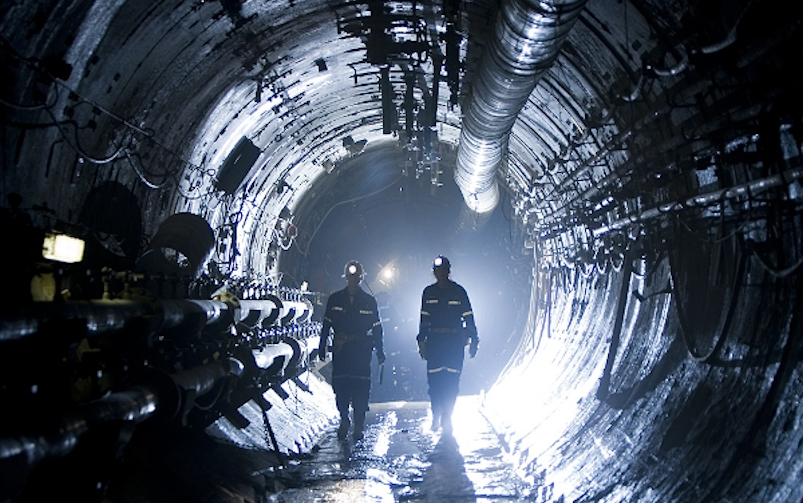Eldorado Gold's Lamaque mine in Quebec will be one of the mines resuming operations after being deemed an essential service. Courtesy of Eldorado Gold.
(Like what you’re reading? Get our weekly recap delivered straight to your inbox each Friday.)
Welcome back to your weekly mining news recap, where we catch you up on some of the news you may have missed. This week’s headlines include Impala Canada putting its Lac des Iles mine under care and maintenance, Sudbury and Port Colborne unions reaching a tentative deal with Vale and mine supply companies trying to plan for an uncertain future.
The Quebec government has added mining to its list of essential services and stated that mines will be able to resume production gradually and under new conditions. Companies wishing to reopen their mines must adhere to a number of new health and safety conditions such as having workers wear protective equipment, doubling employees’ work-site time from 14 to 28 days and using chartered buses and planes to transport workers to remote mine sites.
The Assembly of First Nations Quebec-Labrador (AFNQL) responded to the announcement by questioning the Quebec government’s decision to reopen mines, many of which are located on the traditional territories of several First Nations. In a statement, the AFNQL stressed the vulnerability of First Nations communities to the COVID-19 pandemic, especially regarding the travel of mine workers to remote sites, and that preventive measures must not be relaxed. The statement also highlighted that the decision may compromise the efforts that many First Nations communities have had so far in limiting the spread of COVID-19.
Mine supply companies are finding it difficult to plan for possible outcomes of the COVID-19 pandemic. While government initiatives to support the mining industry such as the federal wage subsidy program have helped, miners are hoping that there will be subsidies for research and development as well. For MineConnect, Ontario’s mining supply and services association, ensuring that mining and mine supply companies will be able to resume and continue activities once the dust settles is paramount.
Impala Canada has placed its Lac des Iles palladium mine in northern Ontario under care and maintenance after six employees tested positive for COVID-19 over the past weekend. According to Impala, most of the 300 or so employees left on April 13 and were asked to self-quarantine for two weeks, while a small crew remains at the mine to conduct care and maintenance. A seventh employee tested positive for COVID-19 earlier this week, as reported by TBNewswatch, and two more employees are awaiting test results. Impala is working with public health officials to conduct contact tracing for all affected workers.
Cameco has withdrawn its 2020 guidance and extended the suspension of its Cigar Lake uranium mine in northern Saskatchewan indefinitely due to the ongoing COVID-19 pandemic. According to Cameco, the decision to extend the suspension beyond the initial four weeks was due to preventive measures and restrictions by the provincial and federal governments, concerns from the region’s remote and isolated communities and the difficulty of maintaining physical distancing with a full staff.
Steelworker unions USW Local 6500 and 6200 have reached a tentative collective agreement with Vale for a one year renewal following several months of bargaining, as reported by Northern Ontario Business. According to the Sudbury and Port Colborne unions in Ontario, the deal will allow union members to focus on the community’s health amid the global pandemic. Union members will receive instructions on voting and details about the tentative agreement, and will be asked to vote on the deal electronically.
Teck has created a $20-million fund to support critical social and health services throughout the ongoing COVID-19 pandemic. The fund will be used to procure medical supplies, donate to medical research and support local and international relief efforts. According to Teck, the fund has already been used to donate 1,000,000 KN95 masks for healthcare workers in British Columbia, advance the use of copper products in infection control and prevention, donate $250,000 to the Canadian Red Cross and establish a community response fund for communities in Canada, Alaska and Chile.
Two weeks after TC Energy Corp. announced it would begin construction on its Keystone XL oil pipeline, the project faces yet another setback. A U.S. judge cancelled a key permit for the pipeline project, stating that the U.S. Army Corps of Engineers did not adequately consider effects on endangered species in the proposed pipeline’s path, as reported by AP News. While the permit will be necessary for future construction, construction work is already underway at the U.S.-Canada border and will continue.
Interested in brushing up on your mining history? CIM Magazine continues to upload the “Evolution of Shaft Sinking” series to our website. This week you can read up on how evolution in safety, hydraulic power drills, explosives and more impacted shaft sinking from 1970 to 2007.
Nouveau Monde Graphite has mandated Hydro-Quebec to conduct preliminary development, installation and operation at its Matawinie mine site in a step towards electrification of the project. A 120-kilovolt electrical line will connect the Matawinie project to Hydro-Quebec’s power network, and is expected to be complete when the mine opens, which is planned for 2022. Upon completion, the mine is expected to be the world’s first fully electric open-pit mine.
If you’ve got feedback, you can always reach us at editor@cim.org. If you’ve got something to add, why not join the conversation at our Facebook, Twitter or LinkedIn pages? Like your recap with a few more gifs? Check out our mining news recap stories on our Instagram.
Remember to stay safe, stay home and wash your hands!



